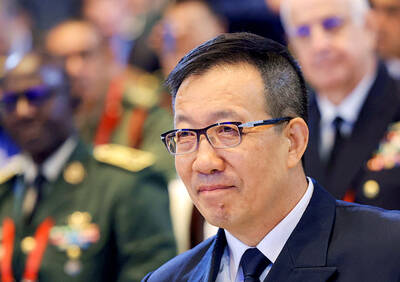Australia’s environment minister rejected a proposal for crocodile safari hunting yesterday, but increased the number of eggs and animals that can be harvested to cull their population and make the country’s north safer for people.
Environment Minister Peter Garrett said the five-year management plan would allow Australia’s Northern Territory to continue exporting crocodile products “on an ecologically sustainable basis.”
Both saltwater and freshwater crocodiles were hunted to near extinction, but have become plentiful in the tropical north since they became protected by federal law in 1971.
In March, after a spate of crocodile attacks killed four people, the Northern Territory government submitted a draft management plan that included crocodile safaris for paying clients, with quotas on the number of the reptiles that could be killed by tourists or trophy hunters.
Garrett said he gave the idea careful consideration but could not approve it.
“I am of the view that safari hunting is not a suitable approach for the responsible management of crocodiles,” he said in a statement.
The approved management plan allows an initial maximum harvest of 50,000 eggs — up from 35,000 in the previous plan — and 400 juveniles, 500 hatchlings and 500 adults for farming, food and export. The egg quota could increase if the population supports it, Garrett said. The plan also allows for the removal of crocodiles that are a threat to people or livestock.
“I am satisfied that the harvest of crocodiles and eggs proposed in this management plan will ensure the population remains at a sustainable level, and includes adequate measures to prevent any long-term drop in population,” Garrett said.
The Northern Territory is estimated to have 80,000 saltwater crocodiles, the highest number in Australia. Saltwater crocodiles, the world’s biggest reptile, grow up to 7m long.
They are more likely to attack humans than the smaller freshwater crocodiles that also inhabit the area.
Northern Territory Minister for Parks and Wildlife Karl Hampton welcomed the new management plan, but said in a statement that safaris would have helped the indigenous community, and his territorial government would “continue working toward approval for safaris in the future.”
The management plan is revised every five years.
Currently, collected eggs and captured crocodiles are harvested for meat, skin, teeth and skulls. The Northern Territory has exported an average of about 6,000 saltwater crocodile skins to other parts of Australia and the world each year for the last six years.

DEADLOCK: Putin has vowed to continue fighting unless Ukraine cedes more land, while talks have been paused with no immediate results expected, the Kremlin said Russia on Friday said that peace talks with Kyiv were on “pause” as Ukrainian President Volodymyr Zelenskiy warned that Russian President Vladimir Putin still wanted to capture the whole of Ukraine. Meanwhile, US President Donald Trump said that he was running out of patience with Putin, and the NATO alliance said it would bolster its eastern front after Russian drones were shot down in Polish airspace this week. The latest blow to faltering diplomacy came as Russia’s army staged major military drills with its key ally Belarus. Despite Trump forcing the warring sides to hold direct talks and hosting Putin in Alaska, there

North Korea has executed people for watching or distributing foreign television shows, including popular South Korean dramas, as part of an intensifying crackdown on personal freedoms, a UN human rights report said on Friday. Surveillance has grown more pervasive since 2014 with the help of new technologies, while punishments have become harsher — including the introduction of the death penalty for offences such as sharing foreign TV dramas, the report said. The curbs make North Korea the most restrictive country in the world, said the 14-page UN report, which was based on interviews with more than 300 witnesses and victims who had

COMFORT WOMEN CLASH: Japan has strongly rejected South Korean court rulings ordering the government to provide reparations to Korean victims of sexual slavery The Japanese government yesterday defended its stance on wartime sexual slavery and described South Korean court rulings ordering Japanese compensation as violations of international law, after UN investigators criticized Tokyo for failing to ensure truth-finding and reparations for the victims. In its own response to UN human rights rapporteurs, South Korea called on Japan to “squarely face up to our painful history” and cited how Tokyo’s refusal to comply with court orders have denied the victims payment. The statements underscored how the two Asian US allies still hold key differences on the issue, even as they pause their on-and-off disputes over historical

BEIJING FORUM: ‘So-called freedom of navigation advocated by certain countries outside the region challenges the norms of international relations,’ the minister said Chinese Minister of National Defense Dong Jun (董軍) yesterday denounced “hegemonic logic and acts of bullying” during remarks at a Beijing forum that were full of thinly veiled references to the US. Organizers said that about 1,800 representatives from 100 countries, including political, military and academic leaders, were in Beijing for the Xiangshan Forum. The three-day event comes as China presents itself as a mediator of fraught global issues including the wars in Ukraine and Gaza. Addressing attendees at the opening ceremony, Dong warned of “new threats and challenges” now facing world peace. “While the themes of the times — peace and development —